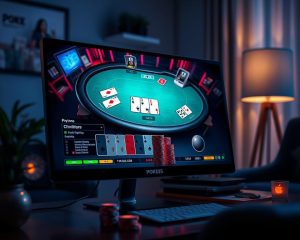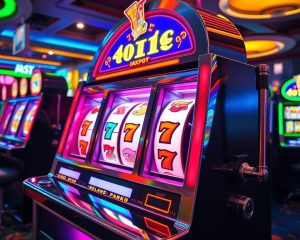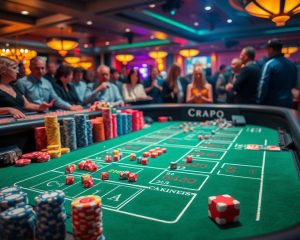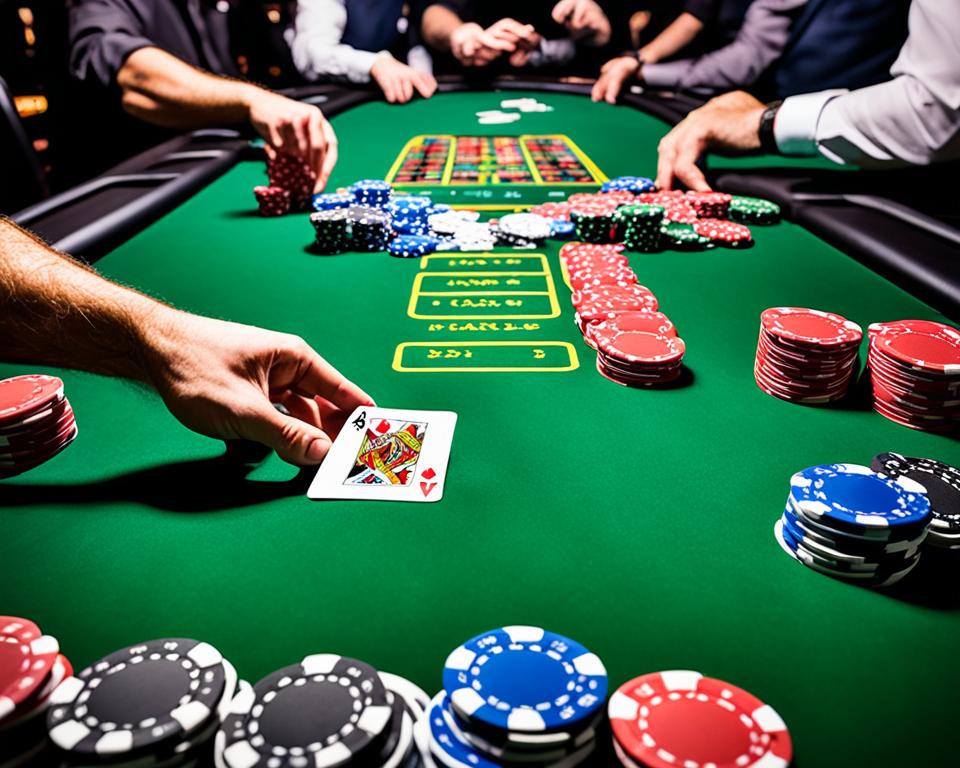
Poker is a game that mixes strategy, luck, and mind games. It doesn’t matter if you’re new or have been playing for years. This guide will give you the key knowledge and strategies to improve your poker skills. You’ll learn everything from the basics to the psychological parts of the game.
This article will share techniques and tips to boost your poker abilities. We’ll go over the rules, hand rankings, and winning strategies. We’ll also explore the math and psychology behind the game. By the end, you’ll know how to play poker like a pro.
So, get ready for an exciting journey to become a poker master. With the right mindset, practice, and understanding of the game, you’ll beat your opponents and win often.
Understanding Poker Fundamentals
To do well in poker, knowing the game’s basics is key. This part covers the poker rules and poker hand rankings that every player should know.
Poker Rules
Poker mixes strategy, skill, and luck. Players aim to make the best five-card hand from their cards and the community cards. The game has rules that guide betting and deciding hands. Knowing these rules helps you play better.
Poker Hand Rankings
The poker hand rankings show which hands are stronger or weaker. It’s important to know this to win in showdowns. The top to bottom list includes:
- Royal Flush
- Straight Flush
- Four of a Kind
- Full House
- Flush
- Straight
- Three of a Kind
- Two Pair
- One Pair
- High Card
Learning the poker rules and poker hand rankings builds a strong poker base.
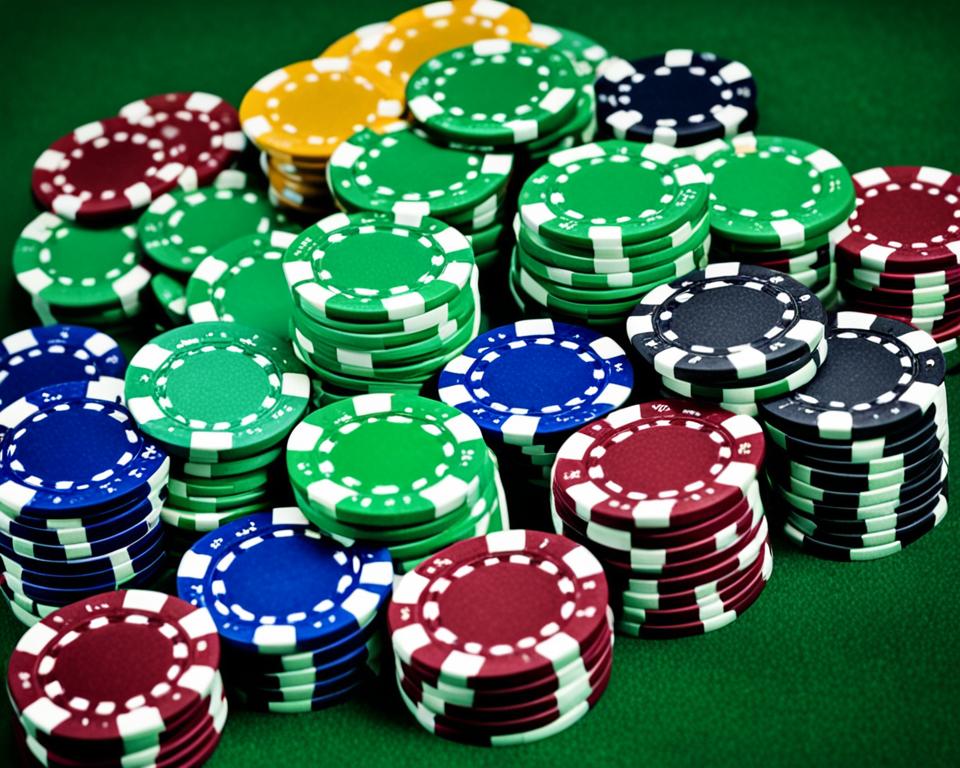
“The key to winning at poker is not just in the cards you are dealt, but in how you play them.”
Developing a Winning Poker Strategy
Creating a winning poker strategy is key to doing well at the tables. Pro players use special techniques that help them beat others. They know how to use position, bet sizes, and risk management to make smart moves.
Position is a big part of winning. It’s about knowing when to act and how your spot at the table changes your decisions. Pros use their position to get info and control the game.
Bet sizing is also vital. It’s about betting the right amount to get the most value from strong hands and to bluff well. Good bet sizing helps you handle tricky situations and keep others guessing.
Managing risk is crucial too. Bankroll management is key for pros. They know when to fold or bet to keep their bankroll safe. Being disciplined in risk-taking helps you survive the game’s ups and downs.
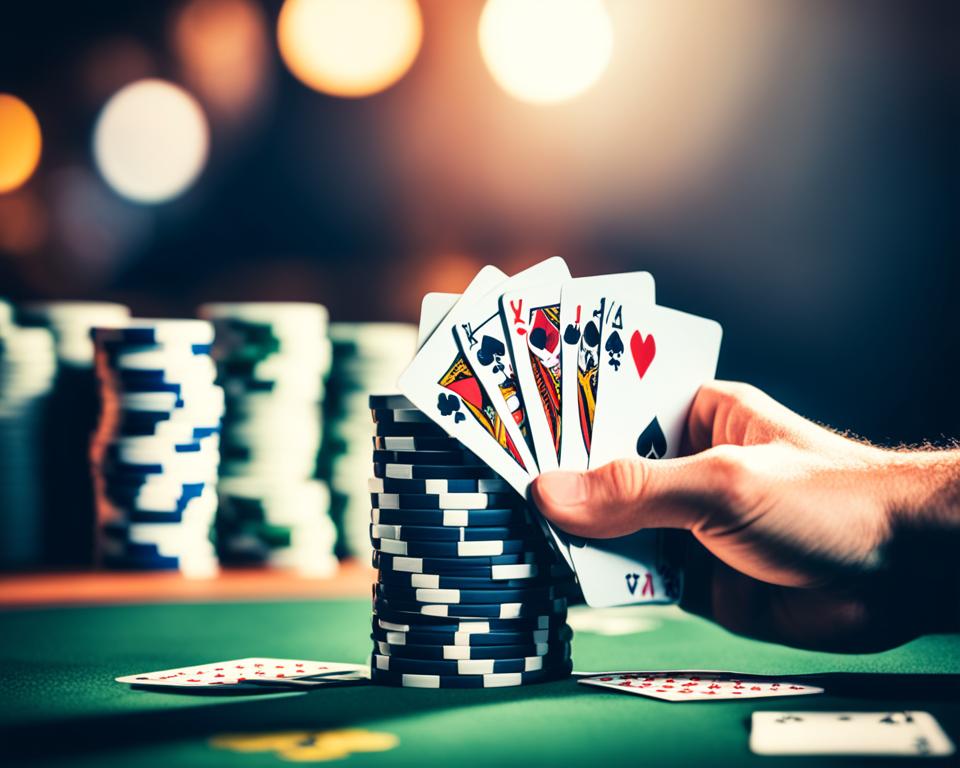
Using these strategies will help you play poker like a pro. Success comes from knowledge, discipline, and being adaptable. Keep improving your strategy, learn from your games, and focus on making good decisions.
Mastering Poker Mathematics
In the world of poker, knowing the math is key to winning. It helps you make smart choices and boost your chances of success. This section covers the math basics every serious player needs to know, from poker odds to poker bankroll management.
Poker Odds and Probability
Knowing the odds of getting a winning hand is vital in poker. By understanding poker odds, players can make better decisions. They learn about pot odds, implied odds, and drawing hands.
- Pot odds: The ratio of the pot size to the cost of the next bet.
- Implied odds: The potential winnings if the desired card is drawn.
- Drawing hands: The chance of improving a hand with more cards.
Poker Bankroll Management
Good poker bankroll management is key for success over time. It helps players manage their money well and avoid big losses. They learn about buy-in sizes, managing sessions, and the right bankroll-to-stakes ratios.
- Buy-in sizing: Figuring out how much to invest in each game or tournament.
- Session management: Keeping a disciplined approach to wins and losses in one session.
- Bankroll-to-stakes ratios: Keeping a healthy balance between your bankroll and the stakes you play.
“Poker is a game of skill, and understanding the math is crucial. By getting the hang of poker odds and poker bankroll management, players can make smarter choices and do better overall.”
how to play poker like a pro
Becoming good at poker takes time, effort, and a strong commitment. By learning from top players, you can improve your skills and win more often. This will help you become a pro at the poker table.
Understanding poker’s basics is key. You need to know the rules, hand rankings, and betting structures. This knowledge forms the base of your poker skills.
Good poker players manage their money well and know the game’s math. They calculate odds and make smart bets to increase their chances of winning. Managing your money wisely helps you handle the game’s ups and downs.
Being able to read your opponents’ tells is crucial. These are small signs that show what they might be holding. Knowing these tells helps you make better bets and win more.
Professional players also keep their emotions in check. They stay calm under pressure and don’t let frustration affect their game. This helps them avoid mistakes and stick to their winning strategies.
To become a pro at poker, you need to know a lot about the game, think strategically, and control your emotions. With practice and study, you can join the top players and enjoy the excitement of playing how to play poker like a pro.
Reading Poker Tells
Learning to read your opponents’ poker tells can really help you win more at the tables. By noticing and understanding their body language and actions, you can make smarter choices. This lets you see what they might be thinking and planning.
Physical Tells
Physical tells are the small actions and behaviors players show during the game. These include things like facial expressions, body language, and nervous habits. With practice, you can spot these tells and use them to your benefit. For example, if a player can’t stop fidgeting or avoids eye contact, they might be showing weakness or doubt about their hand.
Betting Patterns
Looking at how your opponents bet can also tell you a lot about their poker strategy and thinking. Are they always aggressive or do they play it safe? Do they bet big when they have a strong hand, or do they bet small to seem weak? Noticing these patterns helps you guess what they might do next and adjust your strategy.
“The ability to read poker tells is not just about observing physical cues, but also understanding the psychology behind your opponents’ betting decisions.” – Doyle Brunson, Legendary Poker Player
By using what you know about physical tells and betting patterns, you can get a better idea of your opponents’ strategies. This skill takes time and practice, but it can really pay off in terms of winning more money.
Poker Psychology
Poker is more than just cards and numbers; it’s a game of mind and strategy. We’ll look into the mental side of poker, focusing on controlling emotions and bluffing. Knowing poker psychology can really help you beat your opponents.
Emotional Control
Keeping your emotions in check is key in poker. Feelings like fear, greed, and tilt can mess with your thinking and lead to bad choices. Top poker players know how to handle their feelings, staying calm and sharp under pressure.
- Develop self-awareness: Know what makes you emotional and find ways to control it.
- Practice mindfulness: Use deep breathing and meditation to stay calm and focused.
- Embrace losses: See mistakes as chances to learn and grow.
Bluffing Tactics
Poker bluffing is a key strategy, letting you trick your opponents. But, it needs careful planning and skill. Learn to read your opponents and have different bluffs ready to keep them guessing.
“The key to successful bluffing is to make your opponents believe you have a better hand than you do.” – Phil Ivey, Poker Legend
- Observe betting patterns: Notice when your opponents’ bets don’t add up, which might mean they’re bluffing.
- Establish a reputation: Play consistently to make your bluffs seem real.
- Adjust your bet sizes: Change how much you bet to confuse your opponents about your hand strength.
Mastering poker’s mental game will help you play like a pro. Remember, poker psychology is just as crucial as the math and strategy. Mix these, and you’ll be unstoppable at the tables.
Poker Tournament Strategies
Playing in poker tournaments is tough. You need special strategies and approaches. Learning how to manage your chips and adjust to different tournament formats is key to doing well.
Stack management is a big part of tournament strategy. It’s about making the most of your chip stack at each stage of the tournament. This means knowing when to push hard, when to play safe, and how to grow your chip lead.
- Understand the impact of tournament structures: Different formats like freezeouts, re-entries, and bounties need different strategies.
- Adapt your strategy to the tournament phase: Each stage of a tournament requires its own set of tactics.
- Leverage position and stack size: Using your position and chip stack wisely can give you an edge over others.
“In poker tournaments, the ability to adjust your strategy on the fly is crucial. The most successful players are those who can adapt to changing conditions and seize opportunities as they arise.”
Learning these poker tournament strategies will help you do better in high-stakes games. With practice, dedication, and learning from pros, you can improve your poker skills and win more often.
Improving Your Poker Skills
Becoming a skilled poker player is a journey of learning and getting better. To improve, you need to practice and study poker resources. By using these strategies, you can make your game better and move towards becoming a pro.
Practice and Study
Playing poker regularly is key to getting better. Spend time playing, reviewing your moves, and finding what you can do better. Also, study poker strategy, game theory, and how to make decisions.
Always try to learn new techniques and add them to your game.
Learning from Pros
Learning from experienced pros is a great way to get better at poker. Watch how they play, study their thought process, and understand their actions. Join the poker community, go to training sessions, and dive into all the poker tips and resources out there.
By always looking to improve and learning from others, you’ll get closer to mastering poker and becoming a top player.
“The more you play, the more you learn. The more you learn, the better you play.”
Online Poker Strategies
Online poker has changed the game, bringing new challenges and chances for players. To do well online, learning special strategies is key. We’ll look at how to succeed in the fast-paced online poker world.
Playing multiple tables at once is a big plus of online poker, known as “multi-tabling.” It needs a lot of focus and being able to adapt quickly. Good players manage their time well, quickly check their hands, and make quick decisions at each table. This skill boosts their win rate and lets them play more and take advantage of chances.
Adapting your poker strategy for online games is also important. Online, there are more aggressive players and different betting styles. Knowing and beating these trends helps a lot. Using online resources like strategy forums and training sites helps players stay ahead and improve their online poker skills.
There’s a lot of information and tools online that can help poker players. From detailed strategy articles to interactive simulations, the internet has a lot to offer. Adding these resources to their study and practice makes players better and keeps them competitive in online poker.
In conclusion, online poker needs special strategies and adjustments. By getting good at multi-tabling, adapting to online play, and using online resources, players can do well in online poker.
Live Poker Strategies
Mastering live poker is more than knowing the game. When you play in person, you need to adjust your strategies for the unique challenges and etiquette of face-to-face play. We’ll look at the importance of table manners and how to handle the environment to improve your live poker game.
Table Etiquette
Live poker is not just about your cards; it’s also about how you act at the table. Poker etiquette is key for a friendly and respectful game for everyone. Always remember to:
- Speak softly and avoid actions that distract or deceive others.
- Don’t make comments that seem like angle-shooting or misleading.
- Be careful with your chips and cards, and avoid moves that show your hand to others.
- Watch the time and don’t take too long to make decisions to keep the game moving.
Environmental Factors
The live poker environment greatly affects your game. Things like the table setup, noise, and lighting can change how you think and play. To improve your game, think about these points:
- Choose your seat wisely to reduce distractions and see the table well.
- Pay attention to the noise and use headphones if it’s too loud to help you focus.
- Make sure the lighting lets you read your cards and see your opponents clearly.
- Wear layers to stay comfortable in the changing poker room temperature.
By getting better at live poker etiquette and managing the environment, you can make a better playing space for yourself. This will help you do well at the live poker table.
“The true test of a man’s character is how he behaves at the poker table.” – John Leonard
Poker Mindset
Mastering poker is more than just strategy and math. It’s about having the right poker mindset. Understanding the game’s mental and psychological sides helps you handle its ups and downs better.
Being able to manage tilt is key. Tilt is the emotional upset from bad beats or mistakes. Players who stay calm can make better decisions and avoid big mistakes.
“The true test of a poker player’s mettle is not how they handle their wins, but how they respond to their losses.” – Doyle Brunson, Legendary Poker Player
Having a strong poker mindset also means being confident. Trusting your skills lets you take risks and grab chances others don’t see. This confidence and a drive to get better sets apart the top players.
Becoming a poker pro is as much about the mind as it is about strategy. Mastering poker psychology and building a strong poker mindset prepares you for the game’s highs and lows. This way, you can reach your full potential as a player.
Poker Resources
To become a top poker player, you need to keep learning and stay current with new strategies and trends. We’ll give you a list of top poker books, videos, and online groups. These resources are key for improving your poker skills.
Books and Videos
Every poker player should explore the knowledge in great poker books and videos. These resources cover the game’s basics to advanced strategies. They’ll help take your poker skills up a notch.
- Poker Math That Matters by Jared Tendler and Barry Carter
- The Mental Game of Poker by Jared Tendler
- Mastering Small Stakes No-Limit Hold’em by Jonathan Little
- Strategic Poker for No-Limit Games by Ed Miller
- Poker Mindset by Ian Taylor
Online Communities
The internet has changed how poker players connect and share knowledge. Joining online poker groups gives you access to many resources. You’ll find forums, strategy guides, coaching, and mentorship. Here are some top online poker communities:
- Two Plus Two Poker Forums
- Reddit r/poker subreddit
- CardRunners Poker Training
- Upswing Poker Lab
- PokerStars School
By diving into these poker resources, poker books, poker videos, and poker communities, you’ll find a wealth of insights. These can help take your poker game to the next level of success.
Conclusion
As we wrap up this guide, it’s clear that playing poker well takes more than just luck. You’ve learned the basic rules, hand rankings, and strategies. You also understand the math behind the game.
Knowing how to read poker tells and manage your emotions will help you beat your opponents. These skills are key whether you’re in a tournament or playing online. The advice in this article will guide you to success.
Keep improving your poker skills by practicing and studying. Learn from experts in the game. With discipline, flexibility, and a drive to get better, you’ll soon be a top player. This approach will help you win more and take your game to the next level.
